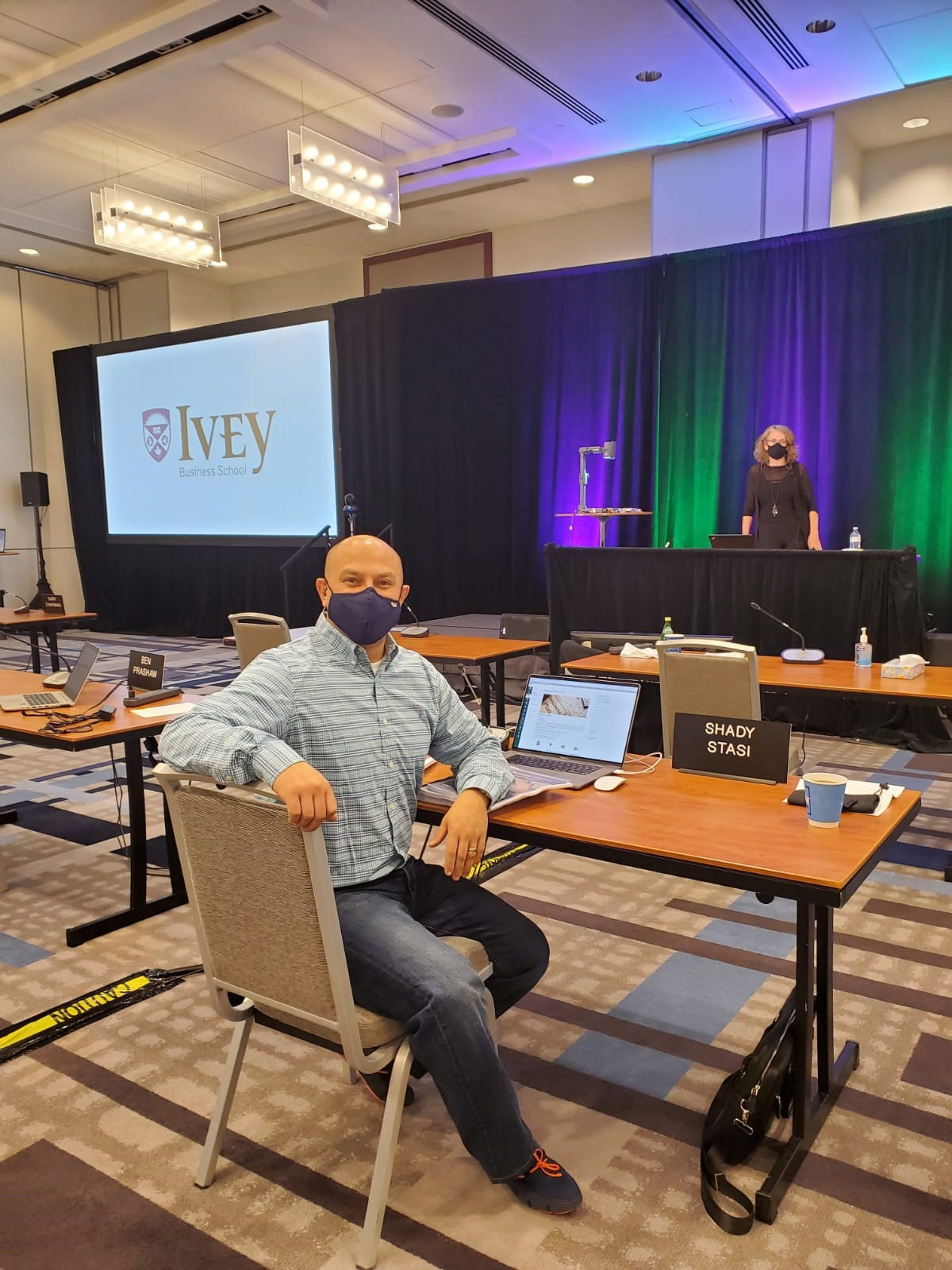My Executive MBA (EMBA) journey was years in the making and for quite some time, I struggled to make sense of the timing. The one thought that repeatedly cast doubt on me starting this journey was, Now is not the right time. I quickly realized that the timing was never going to be perfect, but I needed to take that first step in faith. My name is Shady Stasi, and this is my EMBA journey.
Two months prior to my acceptance into the Executive MBA program, my wife and I welcomed our third child into our family. With three children ages seven, five, and four-months old, and a spouse with a demanding health-care career returning to a hospital setting in a short eight months, we definitely had our hands full. Needless to say, my anxiety level at the start of the program was high. I had started the pre-EMBA material in anticipation of our very first session together and at this time, I began to seriously doubt the feasibility of managing a healthy work-life balance with a new education component. I was also concerned about jumping back into an academic setting having graduated 15 years prior. As deliberate as I was in ruthlessly prioritizing different tasks and deliverables, I quickly learned that I still didn’t have complete control and that I had to learn to live with that stark reality.
Determined to make the absolute most of this opportunity, I started by defining what success looked like to me. Absolutely every emotion ran through my mind from striving for academic excellence to the fear of falling short of expectations, but I relished the opportunity to have my family at graduation day in celebration of the hard work and sacrifice endured over the coming 18 months. Ultimately, I realized that putting my best foot forward at each and every opportunity, while taking everything in and making the absolute most of this experience, is all that mattered.
“Failure is so prevalent in our society because the fear of failure outweighs one’s desire to succeed. Learning to fail again and again and again gives way to a mindset that failure is acceptable if I learn from it. Have the COURAGE to face failure!”—Les Brown
It had been some 15 years since my last visit with post-secondary, structured learning. Here are some things that helped me to prepare.
- Be realistic and aligned – I started this journey by setting a realistic definition of what success looked like to me and this is a practice that I deliberately go through with many things in life. This time around, it wasn’t just defining success, there was the added component of ensuring that it was aligned with the many other aspects of life that I had going on now that I didn’t have during my undergrad years: my career, a spouse with a demanding career of her own, our young family, and a newborn.
An objective approach meant managing all the added complexities that come with competing priorities. I started by level-setting with key stakeholders that were invested in my success in the program: starting with myself, my spouse and family, and my employer, and more specifically, my immediate leader. I refer to these people as the behind-the-scenes supporters. - Know when you’re at your best – Whether you are an early riser or a night owl, you have to assess when you are at your best. I am an early morning person, and this is when I am at my best mental capacity. Getting up early meant getting ahead on coursework before the busyness of the day started with the morning madness of breakfast and getting the kids off to school. It also meant that I was able to protect the evenings for family dinner, helping with bath time, and getting the kids to bed. This also worked well because my weekend was free for family time, sports, and other activities. It was important to me that I didn’t miss out on this time with my family. This also left my evenings open for additional case prep, project deliverables, and team meetings.
- Transparency throughout your journey – After receiving the curriculum, I shared the details with my spouse to plan through team meetings, key deliverables, and class sessions over the coming 18 months. As a fast follow, I replicated this practice with my immediate leader at work to ensure that he had line of sight into the demands on my time and related time constraints during peak periods both with school and the business.
- Prioritization and time management – These two critical elements will repeatedly be put to the test throughout your journey and are specific, but not limited to, life and family, work, and EMBA balance. As such, always make every effort to ensure that you are staying ahead.
- Staying ahead – Related to prioritization and time management is the concept of staying ahead instead of playing catch-up. This is especially true as ‘life happens.’ I invested in a large calendar and mapped out the term ahead. I also relied on my learning team and the scheduled team meetings we mapped out in preparation of the upcoming term, respective sessions, and related case work/deliverables.
Prior to starting the program, you’re told that 25-30 hours per week of work outside of class is required. Some material was net new learning and required a significant time commitment in order to fully grasp the content, while other content seemed in line with my employment experience gained over the years. Ultimately, staying ahead was critical because that 25-30 hours a week would balloon once you fell behind. Nothing more accurate to this point than saying, “You only get out what you put in. Don’t expect more until you do more.” The reality is that your ability to participate and add value in class is indicative of the work you put in advance preparing for the session. - Help is ALWAYS available – I think it goes without saying that help is going to surround you in your journey – all you need to do is ask. Faculty and program staff and EMBA colleagues, both present and past, are willing to help guide and support you in this journey.
Going through the tips noted above at the onset of the program really helped me start on a solid footing. Once the first term was underway, I found myself getting into a groove so-to-speak, having to make minor adjustments along the way.
So far so good. Everything is coming together nicely but, the reality is, from time to time, life happens. I quickly learned that I only need to worry about the things that are within my control while letting the rest take care of itself. A prime example is the pandemic and how it completely turned everything upside down.
 In September, my wife returned to work as a frontline health-care provider amidst a pandemic and this simultaneously coincided with our youngest starting daycare, our two older children returning to school, and the second semester of EMBA starting for me. In addition, due to the severity of the virus and the associated health risks it posed, we instantly lost the limited family support we had. This period in time represented a small hurdle that we overcame together, but our entry into a second lockdown represented a period in time where I thought to myself, How are we going to make this work? There were many days where I thought that this cannot be done. For context, four full days of class from 9 a.m. to 6 p.m. with three children under nine years of age with absolutely no external support from family and a spouse who could be paged to the hospital with little to no warning. It goes without saying that this was the most challenging period of time in my EMBA journey. You quickly learn to get comfortable with having children make surprise visits while you’re on camera or provide a unique soundtrack to your learning.
In September, my wife returned to work as a frontline health-care provider amidst a pandemic and this simultaneously coincided with our youngest starting daycare, our two older children returning to school, and the second semester of EMBA starting for me. In addition, due to the severity of the virus and the associated health risks it posed, we instantly lost the limited family support we had. This period in time represented a small hurdle that we overcame together, but our entry into a second lockdown represented a period in time where I thought to myself, How are we going to make this work? There were many days where I thought that this cannot be done. For context, four full days of class from 9 a.m. to 6 p.m. with three children under nine years of age with absolutely no external support from family and a spouse who could be paged to the hospital with little to no warning. It goes without saying that this was the most challenging period of time in my EMBA journey. You quickly learn to get comfortable with having children make surprise visits while you’re on camera or provide a unique soundtrack to your learning.
If you are a prospective professional considering an EMBA and trying to think through balancing work-life family balance, the single biggest piece of advice I have for you is: Work to develop a single-minded approach to your EMBA journey. I am NOT suggesting that you neglect important elements of your life, but rather having a driving purpose and a resolve to dedicate and protect the time you have for each of the important elements in your life independently.
It goes without saying that this program will challenge and stretch you in ways that you didn’t know were possible. One thing that I kept repeating in my mind was, Bend but don’t break. The reality is, we are creatures of habit and getting into a routine that works for you is absolutely critical to your success.
This is my EMBA journey, and I hope it provides you with context and perspective.

